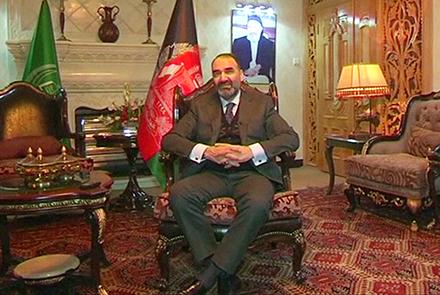Atta Mohammad Noor, one of Afghanistan's most powerful regional leaders, is negotiating with the president to join the central government -- a move which could change the political landscape ahead of elections due in 2019.
From his position as acting governor of the northern province of Balkh, Noor has built a local power base he is now intent on expanding into a national role with an eye to national elections.
Talks with President Ashraf Ghani have been going on for weeks, putting at risk the fragile political balance of the national unity government formed under a U.S-brokered deal by Ghani and his former rival (CEO) Abdullah Abdullah, from Noor's own Jamiat-i Islami party.
With Abdullah's position weakened by dissatisfaction among his own supporters, most of whom come from the Tajik ethnic group in northern Afghanistan, there is potential for a new counterweight to Ghani in a future government.
"I am here to continue my talks with the honorable president and also for the better formation of Jamiat-e Islami party. To discuss with the leadership of Jamiat party and also bring some changes in appointing more deputies within the divisions of responsibility of the party and also in the provinces bringing some changes, working to make Jamiat more active and play an organized role," Noor told Reuters in an interview at his home in the capital.
He said he had not yet taken any decision on which position to accept in the government but he made clear he saw his future in national rather than regional politics.
"After we come to an agreement on our negotiation with the president and we reach a result that is acceptable for all, then I will agree to bring changes in Balkh province, there have been suggestions that I could to take jobs in Kabul but I never asked for a job, my talks with the president at the national level and my demands are for a bigger party participation within the government, that's the priority for me," he added.
A veteran of decades of conflict, who like many Afghan political strongmen, has been accused of funding militias responsible for human rights abuses, he said he hoped to see negotiations between the Afghan government and the Taliban.
While an increase in U.S support for Afghan forces could be a possibility for discussion with the new U.S administration, he said dialogue with the Taliban was vital.
Noor's increased national profile has stirred huge interest on social media and sent a steady stream of politicians and foreign diplomats to his residences in Kabul and Mazar-e-Sharif in the north.
But it has pitted him against Abdullah, his former ally, who has struggled to overcome perceptions that he has been sidelined by Ghani.
Many Abdullah supporters feel betrayed that the national unity government, formed after allegations of massive vote-rigging on both sides, had failed to produce a genuine power-sharing agreement, leaving Ghani in sole charge.
For his part, Abdullah, whose position as chief executive is guaranteed by the power-sharing agreement until the next election, has not reacted publicly. His office declined to comment on Noor's talks with Ghani and the president's palace also declined to comment.
The tensions within the Jamiat party, part of the Northern Alliance formed to fight the Taliban in the 1990s, come amid a twitchy political climate in Kabul and a series of events that have pointed to a broader realignment in Afghan politics.
Massive unemployment and insecurity has pushed thousands of young people to leave and the Taliban insurgency has increased its hold, leaving security forces in control of no more than two thirds of the country.
Last year's agreement with the Hizb-e Islami faction led by Gulbuddin Hekmatyar has brought a potentially significant new Pashtun group into the government fold, leaving many within Jamiat feeling further isolated.
Problems with First Vice President Abdul Rashid Dostum, an ethnic Uzbek with a powerful support base in the north and an old foe of Noor, has made the situation more unpredictable. Earlier this week, the government ordered the arrest of nine of Dostum's bodyguards following allegations of torture and sexual violence against one of his opponents.


